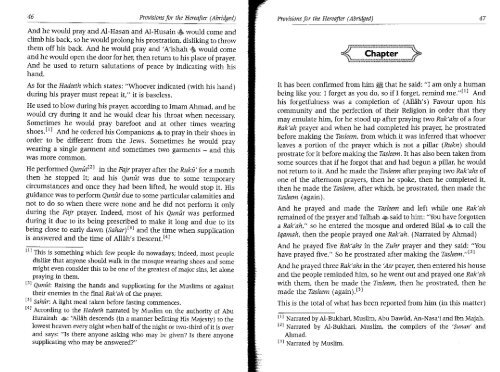Provisions for the Hereafter (Zaad Al-Ma'ad)
Provisions for the Hereafter (Zaad Al-Ma'ad)
Provisions for the Hereafter (Zaad Al-Ma'ad)
You also want an ePaper? Increase the reach of your titles
YUMPU automatically turns print PDFs into web optimized ePapers that Google loves.
46 <strong>Provisions</strong> <strong>for</strong> <strong>the</strong> <strong>Hereafter</strong> (Abridged)<br />
And he would pray and <strong>Al</strong>-Hasan and <strong>Al</strong>-Husain would come and<br />
climb his back, so he would prolong his prostration, disliking to throw<br />
<strong>the</strong>m off his back. And he would pray and 'A'ishah 4, would come<br />
and he would open <strong>the</strong> door <strong>for</strong> her, <strong>the</strong>n return to his place of prayer.<br />
And he used to return salutations of peace by indicating with his<br />
hand.<br />
As <strong>for</strong> <strong>the</strong> Hadeeth which states: "Whoever indicated (with his hand)<br />
during his prayer must repeat it," it is baseless.<br />
He used to blow during his prayer, according to Imam Ahmad, and he<br />
would cry during it and he would clear his throat when necessary.<br />
Sometimes he would pray barefoot and at o<strong>the</strong>r times wearing<br />
shoes. Ell And he ordered his Companions to pray in <strong>the</strong>ir shoes in<br />
order to be different from <strong>the</strong> Jews. Sometimes he would pray<br />
wearing a single garment and sometimes two garments — and this<br />
was more common.<br />
He per<strong>for</strong>med QunUtt 21 in <strong>the</strong> Fajr prayer after <strong>the</strong> Rula <strong>for</strong> a month<br />
<strong>the</strong>n he stopped it; and his QunUt was due to some temporary<br />
circumstances and once <strong>the</strong>y had been lifted, he would stop it. His<br />
guidance was to per<strong>for</strong>m Qunia due to some particular calamities and<br />
not to do so when <strong>the</strong>re were none and he did not per<strong>for</strong>m it only<br />
during <strong>the</strong> Fajr prayer. Indeed, most of his Qumit was per<strong>for</strong>med<br />
during it due to its being prescribed to make it long and due to its<br />
being close to early dawn (Sahar)E 3 and <strong>the</strong> time when supplication<br />
is answered and <strong>the</strong> time of <strong>Al</strong>lah's Descent.E41<br />
P1 This is something which few people do nowadays; indeed, most people<br />
dislike that anyone should walk in <strong>the</strong> mosque wearing shoes and some<br />
might even consider this to be one of <strong>the</strong> greatest of major sins, let alone<br />
praying in <strong>the</strong>m.<br />
zl Qunüt: Raising <strong>the</strong> hands and supplicating <strong>for</strong> <strong>the</strong> Muslims or against<br />
<strong>the</strong>ir enemies in <strong>the</strong> final Rak'ah of <strong>the</strong> prayer.<br />
131 Sahfir: A light meal taken be<strong>for</strong>e fasting commences.<br />
[41 According to <strong>the</strong> Hadeeth narrated by Muslim on <strong>the</strong> authority of Abu<br />
Hurairah "<strong>Al</strong>lah descends (in a manner befitting His Majesty) to <strong>the</strong><br />
lowest heaven every night when half of <strong>the</strong> night or two-third of it is over<br />
and says: "Is <strong>the</strong>re anyone asking who may be given? Is <strong>the</strong>re anyone<br />
supplicating who may be answered?"<br />
<strong>Provisions</strong> <strong>for</strong> <strong>the</strong> <strong>Hereafter</strong> (Abridged) 47<br />
It has been confirmed from him that he said: "I am only a human<br />
being like you: I <strong>for</strong>get as you do, so if I <strong>for</strong>get, remind me."E 1 I And<br />
his <strong>for</strong>getfulness was a completion of (<strong>Al</strong>lah's) Favour upon his<br />
community and <strong>the</strong> perfection of <strong>the</strong>ir Religion in order that <strong>the</strong>y<br />
may emulate him, <strong>for</strong> he stood up after praying two Rak'ahs of a four<br />
Rak'ah prayer and when he had completed his prayer, he prostrated<br />
be<strong>for</strong>e making <strong>the</strong> Tasleem, from which it was inferred that whoever<br />
leaves a portion of <strong>the</strong> prayer which is not a pillar (Rukn) should<br />
prostrate <strong>for</strong> it be<strong>for</strong>e making <strong>the</strong> Tasleem. It has also been taken from<br />
some sources that if he <strong>for</strong>got that and had begun a pillar, he would<br />
not return to it. And he made <strong>the</strong> Tasleem after praying two Rak'ahs of<br />
one of <strong>the</strong> afternoon prayers, <strong>the</strong>n he spoke, <strong>the</strong>n he completed it,<br />
<strong>the</strong>n he made <strong>the</strong> Tasleem, after which, he prostrated, <strong>the</strong>n made <strong>the</strong><br />
Tasleem (again).<br />
And he prayed and made <strong>the</strong> Tasleem and left while one Rak'ah<br />
remained of <strong>the</strong> prayer and Talhah 4 said to him. "You have <strong>for</strong>gotten<br />
a Rak'ah," so he entered <strong>the</strong> mosque and ordered Bilal to call <strong>the</strong><br />
lqamah, <strong>the</strong>n <strong>the</strong> people prayed one Rak'ah. (Narrated by Ahmad)<br />
And he prayed five Rak'ahs in <strong>the</strong> Zuhr prayer and <strong>the</strong>y said: "You<br />
have prayed five." So he prostrated after making <strong>the</strong> Tasleem." 121<br />
And he prayed three Rak'ahs in <strong>the</strong> 'Asr prayer, <strong>the</strong>n entered his house<br />
and <strong>the</strong> people reminded him, so he went out and prayed one Rak'ah<br />
with <strong>the</strong>m, <strong>the</strong>n he made <strong>the</strong> Tasleem, <strong>the</strong>n he prostrated, <strong>the</strong>n he<br />
made <strong>the</strong> Tasleem (again)9 1<br />
This is <strong>the</strong> total of what has been reported from him (in this matter)<br />
I I I Narrated by <strong>Al</strong>-Bukhari, Muslim, Abu Dawild, An-Nasa'i and Ibn Majah.<br />
121 Narrated by <strong>Al</strong>-Bukhari, Muslim, <strong>the</strong> compilers of <strong>the</strong> 'Sunan' and<br />
Ahmad.<br />
111 Narrated by Muslim.

















